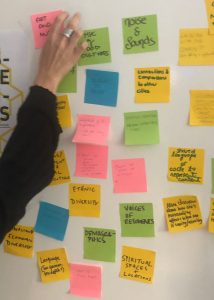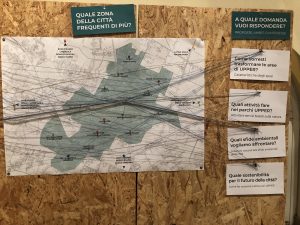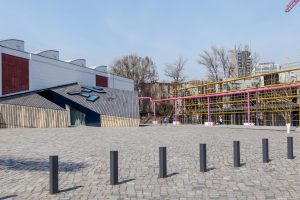On November 29th, 2021, URBACT, together with EUROCITIES, organised the Culture and Social Inclusion in Cities webinar, bringing together cities and European networks and programmes to discuss and promote inclusive approaches to cultural policies in cities.
The webinar showcased the results of the work carried out by URBACT and EUROCITIES within the framework of the Urban Agenda Partnership on Culture and Cultural Heritage, and the experiences of the cities of the URBACT ACCESS network and the partners of the Partnership on Inclusion of Migrants and Refugees, including the findings of a new study conducted by the Migration Policy Institute Europe.
URBACT Expert Laura Colini opened the webinar by introducing the reasons behind organizing the event: “cross-fertilizing each other’s knowledge on cultural participation” in the context of the EU URBAN AGENDA policy framework to which the event was connected. Laura highlighted the role of culture and inclusion as key indicators for social equity, but also discussed the gaps and challenges that exist in the EU. The data available at the European level from Eurostat on cultural participation dates back to 2015, and there are questions that need to be reconsidered and possibly reanalysed in the face of the pandemic.
Areas in need of further examination and discussion include:
- the capacity to measure cultural participation at subnational levels
- effective methods for improving participation
- methods for measuring the effectiveness of social inclusion strategies
- the need for differentiation of passive and active culture in policy design
- the role of cities in decolonizing cultural offerings
- strategies for improving working conditions in cultural sectors in response to the effects of the pandemic

The spotlight then passed to Julie Hervé, Senior Policy Advisor of EUROCITIES, who presented the findings of a survey conducted by EUROCITIES and URBACT as part of of the UA Partnership on Culture and Cultural Heritage. The survey was aimed at identifying the research needs of cities in the fields of culture and cultural inclusion, as well as local cultural services fostering social inclusion. The online survey was conducted in May 2021 and identified the research needs of more than a dozen European cities in relation to people, space, education, health and well-being, governance and data. One important outcome of the study has been the systematisation of a large volume of data regarding cultural inclusion and participation, which can also be used by other cities that did not directly participate.
The second panel of the webinar presented good practices in local cultural and social inclusion based on research around some of the partner cities in the URBACT ACCESS network (specifically Tallinn, Riga, London and Tampere) and URBACT city L’Hospitalet de Llobregat.
ACCESS Lead Expert Rebekah Polding introduced the network and its methodology and focused on the network’s three key foci: widening participation, decentralisation and data. The goal of the ACCESS network is to draft, with the participation of local citizens, an Integrated Action Plan (IAP) on culture for all, which will be finalised by June 2022.
Examples were also given of some of the inclusive projects of the partner cities:
Riga – BeeHives
BeeHives are mobile cultural spaces offering diverse cultural activities in neighbourhoods lacking any cultural centre. They host concerts, lectures, exhibitions and events for children. Over the three years since their introduction, BeeHives have become a very popular initiative in the city, helping to foster a sense of ownership and empowerment for local residents, and achieving significant numbers of attendees at their events up until the start of the pandemic.

Tallinn – Kalamaja Museum
This unique “museum without walls” was created in Tallinn’s southern district of Kalamaja with the objective of fostering community engagement and participation.
The museum officially opened in 2021, but continues developing as a “work in progress”, collecting stories and narratives from the local neighbourhood. The Kalamaja museum’s primary focus is on accumulating small items, narratives and traditions from local families and re-examining and exploring them with the help of regional artists through public events. The Kalamaja Museum is a good example of successful community engagement practice, not only raising awareness about the neighbourhood, but also creating roots for people living in the area and offering them a platform through which to share their voices.

London – Little Amal Case Study
A small-scale research on the social impact of (large scale) cultural projects, was undertaken in London within the framework of the ACCESS Network. The study was aimed at supporting culture for Londoners by providing valuable information, insights and an action plan on how to ensure culture enriches and empowers all Londoners equally. In particular, the study aimed at identifying innovative ways to address and remove barriers for people who do not traditionally engage with culture and to help build relationships, encourage social participation and avoid social isolation. The impact on people of the arrival of Little Amal (a 3.5 metre tall puppet created to represent the history of young refugees travelling from Syria) in the city last October was taken as a case study on innovative practice.

Tampere – EUROCITIES Culture Forum
The EUROCITIES Culture Forum, hosted online in September 2021, focused on culture, health and well-being in the city of Tampere, one of the EU’s forerunner cities in culture and well-being. Culture is strongly recognized as a source of well-being in the city and the cultural life of the city is very vibrant.
Tampere has created “recipes” for cultural well-being to better understand and describe how different cultural services work for well-being. The “menu” courses are “pasta” and “gluten-free pasta”, respectively meaning cultural services open to all and cultural services tailored to different needs.

L’Hospitalet de Llobregat – On Stage!
On Stage! is aimed at democratising access to and the production of music and art with an integrated, cohesive and participative approach. Based at the EMMCA (Escola Municipal de Música-Centre de les Arts), a municipal arts centre and music, drama and dance school, the project has enabled culture to be placed at the centre of the city’s social change, boosting links between citizens and tackling segregation. Music and arts education have proven successful in L’Hospitalet in promoting urban social cohesion, diversity and academic achievement, especially focusing on economically deprived areas of the city with high levels of unemployment and poverty.

Lucia Salgado, Research Assistant at the Migration Policy Institute (MPI) Europe, presented the findings of the MPI’s scoping study on the inclusion of migrants and refugees in arts and culture, a study conducted within the framework of the Urban Agenda Partnership on Inclusion of Migrants and Refugees. The study is based on more than twenty interviews across Europe with representatives of cultural institutions, civil society organisations, and migrant-led initiatives, and focuses on the contribution of cultural institutions in supporting participation of migrant-background and minority communities in art and culture. Several policy options were formulated as a result of the study, such as strengthening cultural institutions’ role within the “continuum” of migrant inclusion by facilitating their access to expertise and capacity-building, promoting structural approaches to diversity in a participatory fashion, cultivating links between cultural institutions and migrant communities, leveraging cultural inclusion for sustainable urban development and pre-existing cultural networks promoting cross-sector exchange.
Anna Kedziorek (European Commission DG EAC), acting as closing speaker, provided an overview of the role of the European Commission in the debate on culture and social inclusion in European cities. Kedziorek praised the resourceful and creative projects presented during the day and highlighted some actions and research carried out by the Commission on related topics, such as H2020 CLUSTER 2, the New European Bauhaus and CulturEu.


